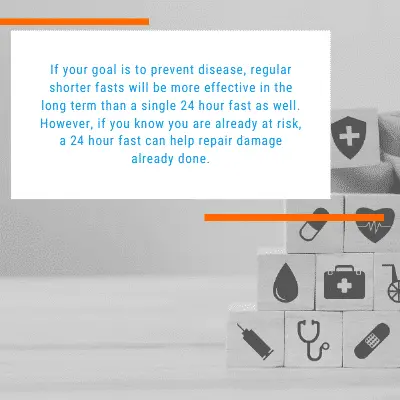If you’re considering fasting for 24 hour hours, you may be wondering if it’s long enough to make it worth the pain of giving up food for a day. Can anything really be accomplished in 24 hours?
That’s exactly what we’re going to dive into in this article – the benefits of fasting for 24 hours, how to get your body ready for a full day fast, and how to make it through alive.
Is Fasting for 24 Hours Beneficial?
Let’s get the easy answer out of the way first. Yes, fasting for 24 hours has been shown to improve health in a variety of ways.
Is it going to change your life overnight? No, not likely, but it may make enough of a change to encourage you to continue making small changes on a regular basis that will have life-long implications to not just your weight, but your whole health.
To keep you alive, your body converts the energy you consume from food into energy that it can use to power your body. The easiest source of energy to accomplish this task comes from carbohydrates, but if it must, your body will also use protein and fat. They’re just a little bit more work to break down and convert to useable energy.
If you eat more calories than your body needs to keep everything operational, it will store the extra in your fat cells for a time in the future when you may not have easy access to food. When you fast, your body figures you don’t have access to food, so it digs into this stored energy.
Your metabolism will wait at least 12 hours before it is bothered enough to look inside for energy, so in order to see any results at all from fasting, you have to restrain yourself from eating for at the very least 12 hours. At this point, your body will enter what we’ll call “fat-burning mode.”
Truthfully, when you stop eating, your body will start looking for anything to convert to energy to keep you alive, whether this may be fat, muscle or even old, damaged cells. You’re biologically designed to store fat for use when no food is incoming, however, so this is without a doubt the first resource.
Is Fasting For Longer Better?
Many people see weight loss results when they fast for only 12 – 16 hours a day, even if they don’t change their caloric intake. However, the longer you fast, the more likely your body is going to start looking for alternative sources to recycle, such as damaged or dead cells that haven’t been cleaned up and are prime targets for cancer cells to latch onto.
For this reason, the longer you stay in a fasted state, the more time your body has to do some much-needed internal housekeeping. This can reduce your risk of developing cancer as well as heart and brain disease, as the plaque that has built up that is doing you no good can start to be recycled.
Also, the longer you fast the more efficient your metabolism becomes as converting energy, because it has become a much more precious resource. The same is true for your hormones, which have to communicate much more effectively with each other to make sure all your resources are being properly allocated. This improves blood sugar balance and appetite control, among other benefits.
For health purposes, a 24 hour fast will be more effective than a 14 hour fast. However, if your primary goal is weight loss, shorter fasts performed more routinely will have better long-term results for you. Your body will get more and more effective at burning fat with practice, so stressing it a little each day is better for weight loss.
If your goal is to prevent disease, regular shorter fasts will be more effective in the long term than a single 24 hour fast as well. However, if you know you are already at risk, a 24 hour fast can help repair damage already done.

How to Prepare For a 24-hour Fast
The level of preparation you need for a 24-hour fast is going to vary based on your current health and your current eating patterns. If you have any health concerns at all, it is important that you discuss fasting with your doctor before you restrict eating for this length of time. It is also highly advisable to have someone who understands the risks and protocol monitoring you, just to be safe.
If you’re used to constantly eating throughout the day, having breakfast as soon as you get up and snacking until you go to sleep, a 24-hour fast is going to be a considerable shock to your system.
In my experience as a fasting coach, you will be more likely to enjoy the results of fasting and continue incorporating it into your lifestyle if you work your way up to a 24-hour fast.
Top 5 Tips To Prepare for A 24 Hour Fast
- Proactively Nourish. Spend the week before you fast pumping as many nutrients into your body as possible. This does not mean put more fat into your system to give it more to burn – that would be counterproductive. It does mean focus on nutrient-dense plants such as vegetables, fruits, nuts, seeds and legumes, and high-quality sources of protein and healthy fats.
- Practice. See what it feels like to go 12 hours without eating, or maybe even 14 hours. Give yourself a little taste of hunger so that you know you will be able to handle 24 hours.
- Prepare your schedule. Chances are, you will be uncomfortable during the 24 hours of your fast, so plan your time accordingly. If you don’t love your work, plan your fast for a day off. If you do love your work, consider taking some overtime to keep yourself occupied. Don’t schedule your fast near holidays or celebrations, or on a day when you are typically at a social event. Do plan to keep busy doing things that don’t involve eating or drinking. Distraction will be your friend!
- Have Your Mindset Straight. Before you start your fast, take some time to think deeply about your health goals. When you’re tempted to break your fast, remember why you’re doing it and continue to remind yourself that it is only 24 hours.
- Look Forward to Sleep…or not. Sleep can be a blessing or a curse when you’re fasting. If you can fall asleep, it means you will be blissfully unaware of many of the hours you are not eating. Unfortunately, fasting can sometimes make it difficult to fall asleep. If necessary, try practicing some soothing yoga poses, following a guided meditation or listening to an adult bed-time story.
How To Break Your Fast
After an extended fast, your digestive system will be more sensitive than usual, so break your fast gently. Eat a small, nourishing breakfast that is easy to digest, such as a small bowl of oatmeal with some fruit. Anything fried should be avoided, as it will likely cause indigestion and anything that is full of sugar is going to send your blood sugars on a roller-coaster ride. Focus on complex carbohydrates, high-quality proteins, or healthy fats. Avoid binge eating as a reward for your fast, that is simply taking one step forward and two steps back.
If you want to dabble in another type of fast before you commit to a full 24 hours, you may want to read our related post, Types of Fasting, to learn which fast is ideal for you at this point in time.
Case Studies and Research
Prolonged fasting-induced metabolic signatures in human skeletal muscle of lean and obese men



